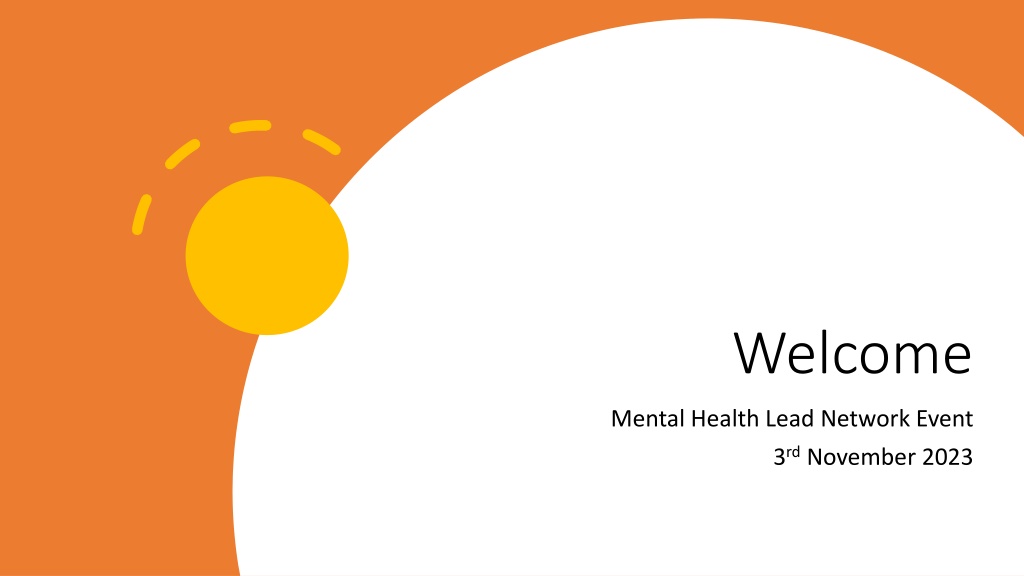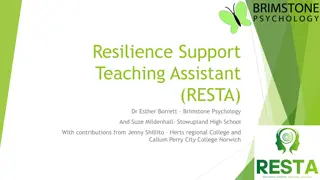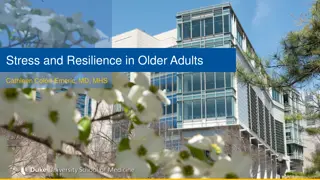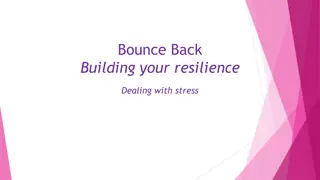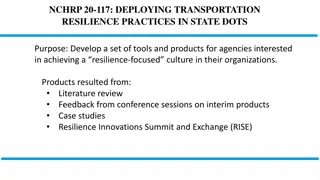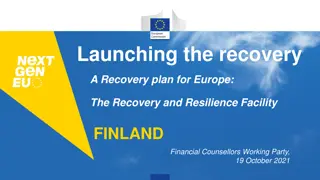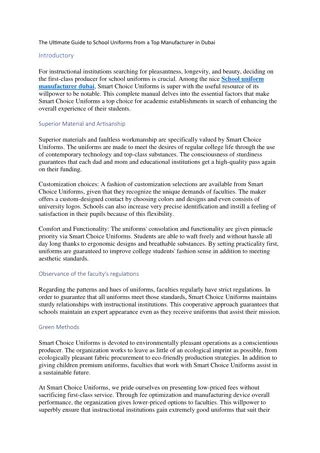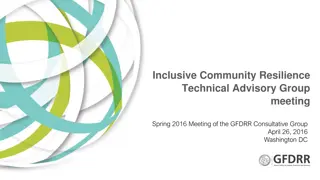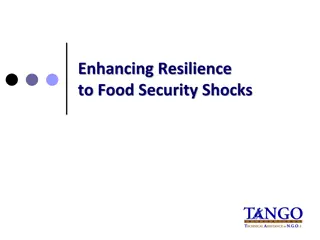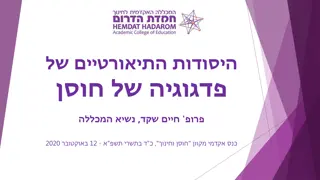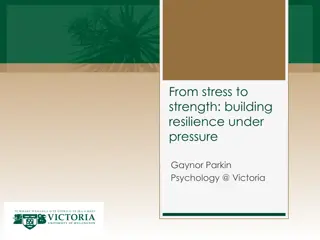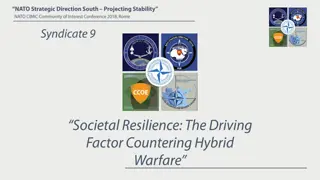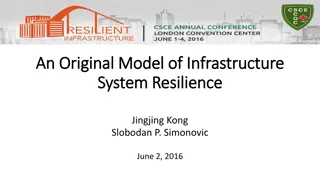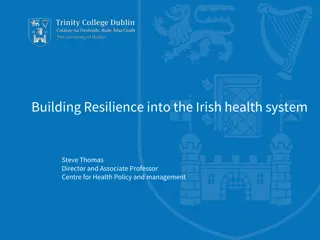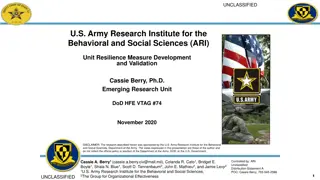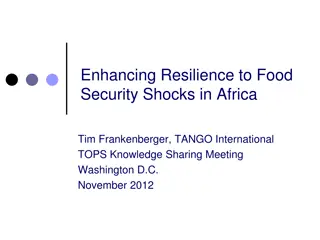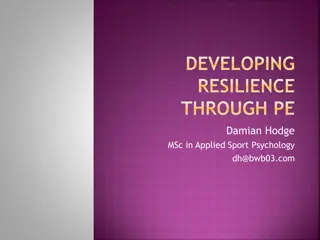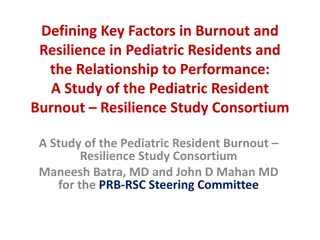Enhancing Educational Resilience with RESTA Model
RESTA is an evidence-based intervention model designed to boost Educational Resilience in young individuals by involving educational staff. It differs from other support models by incorporating insights from educational resilience and trauma-responsive practices. Two underpinning models and RESTA protective factors contribute to its success, as evidenced by increased resilience levels, attendance, and retention rates. The structured and person-centered approach guides practitioners in assisting individuals in their journey towards resilience. RESTA is grounded in Trauma Responsive practice, emphasizing adaptive skill-building and positive experiences for educational success.
Download Presentation

Please find below an Image/Link to download the presentation.
The content on the website is provided AS IS for your information and personal use only. It may not be sold, licensed, or shared on other websites without obtaining consent from the author.If you encounter any issues during the download, it is possible that the publisher has removed the file from their server.
You are allowed to download the files provided on this website for personal or commercial use, subject to the condition that they are used lawfully. All files are the property of their respective owners.
The content on the website is provided AS IS for your information and personal use only. It may not be sold, licensed, or shared on other websites without obtaining consent from the author.
E N D
Presentation Transcript
Welcome Mental Health Lead Network Event 3rd November 2023
An Introduction to RESTA Dr Esther Borrett, Brimstone Psychology
What is RESTA? RESTA is an evidenced based model of intervention and support designed to increase Educational Resilience in young people Utilises educational setting staff to be able to support students Follows other models of school support (trained member of staff receiving psychological supervision from Educational Psychologists) Differs from other models of support (concise, sequential approach untilising evidence from both educational resilience and trauma responsive practice)
Two Underpinning Models Protective factors in educational resilience (Borrett, 2019, Borrett & Rowley, 2020; Carter & Borrett, 2023) The Applied Trauma Responsive Classroom Model (Carter, 2022, Carter & Borrett, 2023) Based on research with returners to education- what helps you to be resilient in education second time around? Mapped out all education from early years to university level Connection and support, positive experiences and adaptive skill building
Two Underpinning Models Has evidence based on what works taken from students themselves Is person centred and responsive to individual need and academic level Is structured and sequential Not only gives the practitioner skills to be responsive to trauma but to also how to move an individual on in their journey to increase resilience Evidence of the programme working (significant increase in educational resilience levels following intervention, increased attendance and improved retention) Is underpinned by Trauma Responsive practice
2017/18: Researching Educational Resilience What works? 2017/2018: First Educational Resilience Programme 2018/2019: Second Educational Resilience Programme 2019: Findings published revision of the original programme 2022: Collaborative meeting between EP, Headteacher, Social Worker What might RESTA look like? 2023: Completion of all resources, checked for validity across levels by students at Suffolk New College 2020: COVID demand outweighed the supply Is there another way? 2022: Pilot Suffolk New College. Dr Carter s work on the ATRCM 2023: End of pilot, collaborative review Headteacher, teachers, EP and student Are we there yet? 2023: SEND Colleges of excellence input 2023: Schools would this work for EBSA? A special mention and thank you to Trudi Rose-Porter, her team and students at Suffolk New College who have been instrumental to the latest pilot design! RESTA: The Journey so far
RESTA: What next? January to March 2024 Next stage of pilot, first RESTA s trained (we currently have 10 places left) March 2024 onwards review of evidence and adaption to programme Summer 2024 RESTA launch to all Summer 2024 RESTA handbook, RESTA journals Up coming projects: Step In, Step Out (NCC). RESTA for EBSA support
NOTICES AND REMINDERS: Children s Mental Health Week, 5-11 February 2024 Place2Be have announced the theme for Children s Mental Health Week 2024: My Voice Matters. Developed with the help of children and young people in Place2Be partner schools, My Voice Matters is about empowering young people to use their voices and share what matters to them while encouraging those around them to hear their voices. Click here to find out more and see how you can get involved in Children s Mental Health Week. Mental health lead training from the Department for Education A reminder that the Department for Education (DfE) are offering grants of 1,200 for mental health lead training in your educational setting, and if you have previously claimed a grant and your mental health lead has moved on from your setting you can now apply for a second grant to train a new mental health lead. The training will help to: Better understand wellbeing needs Achieve the best possible outcomes from your existing in-school provision Develop approaches aligned with your DSL/SENCO s work Develop your universal and targeted support offer Engage pupils and learners, and work with parents/carers How do I apply? If you haven t already done so, click here to claim a 1,200 grant and access DfE quality-assured training tailored to the needs of your setting. If you previously claimed a grant and your mental health lead has left your setting, you can apply for a second grant here.
NOTICES AND REMINDERS: November marks the beginning of Movember, a time to raise awareness of men s mental health. A recent UK survey showed that 40% of men reported to have never spoken to anyone about their mental health; Movember is the perfect opportunity to shine a light on men s mental health and get boys and men talking. You can get involved by sharing our "Busting myths for Movember" Kooth podcast, or our "Breaking the stigma" short film around men s mental health (we recommend this video for ages 17+). Message from Suffolk Mind: Our new materials relaunch is in February for Children s Mental Health Week, called the Children and Young People s Kitbag, but if any schools would like support in the meantime, please direct them to schools@suffolkmind.org.uk and we will be able to help. Please add any comments to our graphic and / or let us know if you d like to be part of our MH network steering group or have any requests / ideas for future MH network meetings.
Mental health and wellbeing calendar: autumn term 2023 : Mentally Healthy Schools
